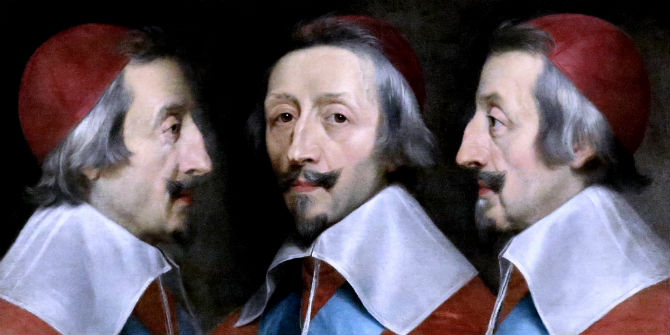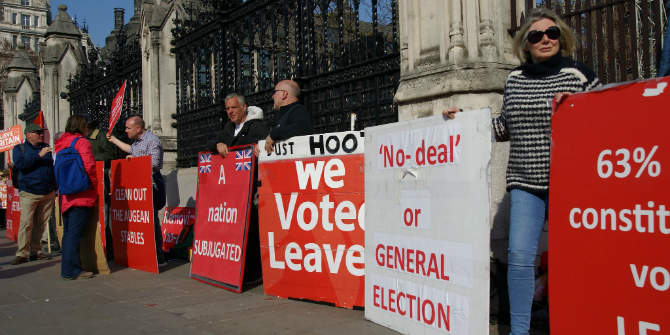 Agreement in Brussels continues to elude the British. Michael Reynolds (University of Plymouth) looks at the history of European diplomacy. The 17th-century statesman Richelieu shunned domestic politics in favour of a diplomacy that put national interests first. This prized certainty in negotiations, and informed the public of the consequences of policy. Little of his approach seems to be shared by the current UK government.
Agreement in Brussels continues to elude the British. Michael Reynolds (University of Plymouth) looks at the history of European diplomacy. The 17th-century statesman Richelieu shunned domestic politics in favour of a diplomacy that put national interests first. This prized certainty in negotiations, and informed the public of the consequences of policy. Little of his approach seems to be shared by the current UK government.
In his Chichele Lectures, given at Oxford in 1953, the diplomat Harold Nicolson described how a form of diplomacy and negotiation had existed from “the dawn of history.” In what he called “the evolution of the diplomatic method”, he described the process adopted by the Ancient Greeks in reaching a settlement between states. First there was a reconciliation; then an arrangement; followed by a compact or alliance and commercial treaty, and finally the conclusion of peace between the disputants.
In many respects, the Greeks triggered the development of the machinery of diplomacy and what we now know as international law. But, as Nicolson tells us, it was not until the Renaissance that the process became tainted. The toxins of duplicity and suspicion emerged. The Byzantines taught the Venetians, who in turn taught their Italian neighbours, and they taught the delegates of France and Spain – so that eventually a pattern was set for the whole of Europe. This became especially problematic at the time of the Reformation, when one faction attempted to impose its will upon another and tear Europe apart. As Grotius lamented: “if only they would think quietly, instead of feeling wildly, humanity would be relieved of much meaningless wastage and much atrocious suffering.”

Nicolson tells us that this impediment to European relations was broken by France’s arch-diplomat, Cardinal Richelieu. He had no qualms about allying France with religious opponents. His interest was not to appease domestic politics but to act in the best interests of his state. For him “the interest of the state was primary and eternal; it was above sentimental, ideological or doctrinal prejudices and affections.” Whist he professed that no foreign policy could succeed unless it had national opinion behind it, he also advised his autocratic ruler that steps must be taken to inform the people through ‘mes petits écrits’.
While Richelieu was not always exemplary in his dealings, he was true to a fundamental tenet of diplomacy: the element of certainty. He also advised that a state should speak with one voice, not (as President Kennedy once suggested) like the three horses of the troika all going in different directions. As Nicolson wrote:
“Unless some certainty existed that an agreement once signed would be ratified and executed, then give and take of negotiation became impossible, and international conferences degenerated into assemblies for the exchange of entertainment, platitudes or propaganda.”
Nicholson’s experience in the Foreign Office may offer some lessons for negotiating Brexit. First, that even the ancient Greeks had a rudimentary process for reaching agreement. Second, that from Richelieu’s time onwards foreign policy became overwhelmingly guided by the national interest. Third, that the people must support that policy and be informed of its consequences. Fourth, that diplomats must be allowed to have confidential discussions and to report back free of influence by domestic political agendas. Fifth, that the aims of the policy diplomats follow must be clear and certain.
It is therefore disturbing that the British, and especially the English, have not been informed of the process of secession and remain divided in opinion – as are their representatives in Parliament. Much of this might be assuaged if those in control of events heeded the wise advice of Lord Kerr and took the people into their confidence, as Richelieu suggested to Louis XIII. People have a right to know what the Article 50 process – as well as the Article 218 process – entails. It is not a quick fix and requires detailed discussion, negotiation and legal advice of the highest order.
In an address to George III after a proposed secession from Parliament of all those who opposed the war on English subjects domiciled in the British North American colonies, Edmund Burke wrote:
“The refusal to admit even the discussion of any part of an undefined prerogative will naturally tend to annihilate any privilege that can be claimed by every inferior dependent community, and every subordinate order in the state.”
This post represents the views of the author and not those of the Brexit blog, nor the LSE.
Dr Michael Reynolds is a PhD House Tutor and Senior Law Lecturer at the University of Plymouth (GSM London research node) and a former Senior Visiting Fellow at LSE Law.







Seems to me the problem is a combination of misleading rhetoric and democracy. I find it hard to believe though that this is an entirely new problem. Those beautiful white Greek statues were originally pretty garishly coloured.
No one is misleading anyone on the potential impact of leaving the EU, which includes the Commission seeking to extort as much money as possible from us for a variety of reasons, including ensuring that Germany doesn’t have to contribute more (which they have said they will not do) and ensuring that a range of other member countries continue to be heavily subsidised.
The benefits of leaving the EU is the area least talked about and where it is raised it is drowned out by the hysterical remain lobby.
Please enlighten us Karl, what are the benefits??
I am writing a dissertation at SOAS on the subject. I am a postgraduate student of global diploacy, Nicholson and Richelieu are in the sylybus and I have written my proposal and several chapters of the dissertation. Our work sounds similsimilar interest.